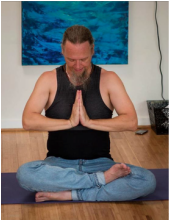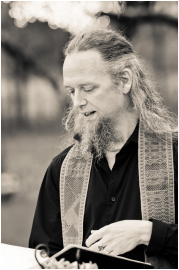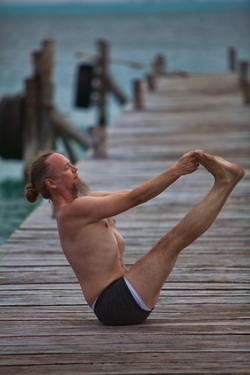
Often times, we don't know the way, or it's unclear what action we should take. Some of the time, when we are beginning a new endeavor or moving into a new area, we can wonder and ponder whether we are making the right choices, whether our efforts will yield results or be fruitless.
The asana practice is a place to experience - to experience life, self, our emotions, our physical form, our mental and emotional state. And it's a place to work on transformation, on change and on growth. Many times this means leaving one thing to make space for another, letting go of something in order to open your hands and hearts to another.
Folks often ask if yoga is a religion - isn't it part of Hinduism? Well, it bears many similarities to religion, it has dogma, it has scriptures, it refers to deities and supernatural events. However, in my experience, it's more of a cafeteria arrangement rather than one codified belief system. And I use that term specifically - a 'belief' system.
In my estimation, the largest distinction between the asana practice of yoga versus a religion is this: religions require belief through faith; the pathway to the divine is not in knowledge but rather in wonder. In religions, there is scripture that asks you to take acts and words and deeds on faith, and to believe in those things that are intangible. There is no real desire for experience outside of faith - true, the experience folks can have during religious ceremonies or religious ecstasy is no less profound, but it comes as an article of faith and belief to create the experience.
Asana practice, on the other hand, doesn't require the scripture, or the deities or the accompanying fables and parables. I do feel that it's greatly enriched by those factors, but first and foremost the intention of asana practice is a connection with self, and internalization of attention and effort in order to create sacred space.
Religion, by it's nature, casts this experience externally and ask us to move away from self towards the perceived godhead in order to experience the sacred. I'm not here to comment any further than that, just that the practice of asana internalizes what is divine through experience, and I suggest that religion externalizes that which is divine through faith and belief.
Ultimately, whichever path leads one to the experience of wholeness, of godhead, of personal and transpersonal union with that which is greater, is not important how one gets there but rather that there is movement on a path.
So, just ponder the consideration - think about how you relate to the greater experience in those times where you feel lost, alone, disconnected, uncertain, wary or confused. Do you rely on your faith? Do you have a strong sense of belief - belief in things going your way, or it all working out right?
Do you rely on experience - and if you do, where do you go to experience what you can, in order to investigate your place in the big dance, in the great ongoing mini-series we call your life!?
I like the asana practice - it's a great reminder and a living metaphor for a spiritual practice. It connects me with me, with that which is greater, it requires compassion and growth, it is unwavering and it creates experiences within me that fortify me through my struggles and my challenges.
What do you do? What do you rely on? What gives your faith? Where do you derive belief - and how do you use those tools to keep it all onward and upward?
Think on it, strike out a comment or opinion, share, but above all, give thanks and praise!



